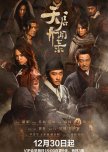
An Oriental Odyssey.
Chu Sijing, a captain of theJinyiwei/锦衣卫 or Embroidered Guard is on a mission to investigate a strange epidemic that broke out on the remote Wumu Island in Liaodong province. The outbreak threatens the adjacent NInghai Fortress, a critical stronghold against the invading Jurchens. The powers that be have their own agendas and appear more interested in covering up the outbreak than anything else. Thus Sijing steals onto the island aided only by a Mongol Tartar official Bo Yan and a Fulangji/佛郎机 businesswoman Angelica. There he encounters mysterious, disease afflicted villagers who worship ancient Gods and is forced to deal with some monstrous truths. Can he weed out the root of the epidemic before it overwhelms them all?This story is set in the 3rd year of Tianqi, when the Ming Dynasty was in rapid decline. It was a time of many natural disasters from meteorites to a mini ice age, drought and famine. Superstition reigned high as the peasants were starving and the emperor was widely said to have lost the Mandate of Heaven. The drama invests heavily in world building and weaves in many themes from the period and fantastical creatures from Chinese mythology 山海经/Classics of Mountains and Seas and 神异经 / Classics of Gods and Spirits. Even though the CGI is not the best, I appreciate the effort that went into how they blended history, fantasy and ancient lore together to make this an Oriental odyssey.
Unfortunately all the research and creativity that went into world building is wasted on the story's plot which hints heavily at a complexity that never materialises. For such a short drama, there are too many subplots touching on many themes that go nowhere. Even ignoring Sandrine Pinna's appalling Disney cartoon character acting, the entire Angelica/Pirates of the Caribbean arc adds nothing to the story. The time would be better spent fleshing out the motives of the Henggong cult and tying up the many loose ends to the story. I usually like Huang Xuan's acting and enjoyed his chemistry with Bo Yan but this is not his best role. Maybe it is the overuse of green screens but I caught him frequently out of the moment and staring blankly into space. Shen Rang is the only character that really moved me and I enjoyed this character design and portrayal the most.
The best things about this drama are that it does try to be different, it is short, some of the action scenes are pretty good and it is oddly enjoyable despite its lack of logical consistency. The ending is anti-climatic, doesn't hang together well, leaves loose ends and is disappointing overall. I am being generous in rating this as a 7.0/10.0.
Questa recensione ti è stata utile?

Sing a Song of Six Spies.
This is a lively, intriguing and exciting romp into the murky world of espionage during the Northern Song period. The various subplots of this drama delve into the counter-intelligence activities of six, young and budding Song spies as they work to undermine Song's arch enemies Liao and Xia. This under appreciated drama carries the hallmark witty dialogue, creativity and manifold twists that made Joy of Life such a huge hit, albeit with lower budget and a young cast.Sing a Song of six spies
A pocket full of lies
Four and twenty black deeds
Faked by a Xia
Six young and promising individuals from vastly different backgrounds are recruited and undergo intensive training at a top secret spy academy. The morally ambivalent Yuan Zhongxin is cunning, cynical and diabolical; the perfect anti-hero in the high stakes world of double agents, conflicting loyalties and multiple betrayals. He is only bested by the fiery and badass Zhao Jian and together, they make a formidable pair. Although Zhao Jian comes off as arrogant and almost dislikable in the beginning, she is a rare strong female character whose desire to be relevant resonates from the get go. Along with the chivalrous Wang Kuan, who is pretty much 11th century google, Zhongxin, Zhao Jian and Wang Kuan are the brains of this outfit of six young spies. The well connected and commercial Wei Yanei alternately bullies or buys them out of trouble while the lethal Xue Ying more than pulls his weight in any skirmish. The disarmingly innocent Xiao Jing is the glue that binds this talented team together. Their goofy antics, youthful idealism, courage and sheer brilliance under pressure shines a bright light into the dark world of spooks and war hawks to whom the ends justify the means.
The rapport and camaraderie between this ensemble cast and how they grow to trust each other and learn from each other is the best thing about this drama. In each arc, one or two characters gets fleshed out and dimensioned - we get to see their home, family, who they care about. The character building is achieved via clever dialogue and suspenseful or action oriented moments that lapse unexpectedly into comedy before transitioning back seamlessly into the previous moment. The characters have unique shared experiences with each other, giving them individualized rapports and further deepening and dimensioning the team dynamics. I watched this right after Imperial Coroner and I cannot help but notice how uncannily similar Xiao Jing/Wang Kuan are to Chuchu/Prince An in terms of archetype. The big difference however is that in Young Blood, both characters grow and develop and they seem more real and fit in naturally with their team.
Most of the danger laden missions or arcs are creatively written and laced with the right mix of action, intrigue, comedy, romance, tragedy and of course betrayal. The superb subplots overflow with richly dimensioned characters - there are so many fantastic grey characters from villains, to rival spies and would be friends were it not for the different loyalties. There are few easy wins for our spy team as they are engaging with smart characters who are consummate liars that can (and do) beat them at their own game. In the last two arcs however, the writing did fall down somewhat. The writer seems unable to stop himself from overindulging in too many twists and surprise about faces. I did not appreciate how some of the smart characters got noticeably dumbed down in order to extend the plot or force additional twists. That said, the ending was good, tying up most loose ends but the end bit was a bit messy obviously to leave the door open for Season 2, which has since been announced. The strong performances, the richness in the characters and the team makes Season 2 a no brainer in terms of something I look forward to watching. Even if it doesn't materialize however, the ending can be considered satisfactory and conclusive. I give this super enjoyable watch a 9.0 although it should be between 8.5 and 9.0 or a 8.75.
Questa recensione ti è stata utile?

The Heart of Genius
25 persone hanno trovato utile questa recensione
Genius is 1 percent inspiration and 99 percent perspiration.
At twenty-three, Lin Zhaoxi lives a life of quiet desperation. She grows up in the shadow of two natural math geniuses - her father Lin Zhaosheng and his mentee and love of her life, Pei Zhi. Despite her passion, her aptitude for math is not intuitive and falls short of true genius. Discouraged, she majors in philosophy and is resigned to a mundane existence. She also loses touch with Pei Zhi after he leaves to further his studies in Germany. Her world unravels further when she discovers her father Old Lin has early onset Alzheimer's. Then out of the blue, she is whisked away to cheese world, a parallel world with a childhood classmate Ji Jiang. In order to return to their world or strawberry world, they must win Math Olympics. This was a challenge she failed as a child. It was arguably the great inflection point that put her on a less satisfactory life path, one that is lacking passion.Don't be put off by the math aspects of this drama; the writer does a good job making abstruse concepts and theorems quite approachable and avoids getting bogged down into the weeds. The storytelling indulges in almost ten episodes of sheer childhood delight as the young Lin Zhaoxi, Ji Jiang and Pei Zhi try out for Math Olympics. The child actors led by Wang Shengdi, Fu Bohan and Lin Zeyi blew me away with their natural and uninhibited articulation of joie de vivre that conquers all. The young cast steals the show with their empowering message that genius is 1 percent inspiration and 99 percent perspiration. The Harry Potter allusions were brilliant - it just cracked me up that no one wanted to be Harry! It also pays proper homage to Snape, one of the most complex, fascinating and moving fictional characters ever written. This is indisputably the strongest, best arc of the drama.
The middling arc is a struggle by comparison as both Zhang Xincheng and Zhang Zifeng take time to get in character and are not that convincing as lovers. It is not a bad arc at all, in fact the father daughter dynamics are very enjoyable and touching. It is just that the first arc is just too good. Initially, Zhang Zifeng seems mis-cast because unlike Ji Jiang and Pei Zhi, I could barely see any vestiges of the child that was Lin Zhaoxi. But upon reflection, it is intended that all of that youthful optimism and sense of invincibility is extinguished. The actress really redeems herself in the latter episodes, especially in her chilling encounter with her doppelganger. Oddly it is Zhang Xincheng's performance that doesn't hit all the right notes in this. I think he is much less comfortable taking on grey or flawed roles. I didn't like Pei Zhi for most of the drama and only empathised with him after his heart to heart with his father Pei Donglai in cheese world. Both the young and grown Ji Jiang is far more charismatic and is seamless portrayed by both actors. As always the veteran actors Lei Jiayin, Wang Xiao (Zhang Shuping) and Geng Le (Pei Donglai) are the ones that save the day by extracting the best performances from the younger actors. In this one, even they are outclassed by the amazing kids. Ni Ni's brief stint as an omnipresent and unforgettable character is both delightful and heartbreaking. The drama picks up pace and comes together in the final act. It finishes strongly with a few good mind blowing twists and reveals to end in a good way. Some may not like how it was all wrapped up but I did and I explain why in a spoiler in the comment section of this review.
The Heart of Genius is a well-crafted and intriguing story about life, love and friendship that is comical, inspiring and heartbreaking. Everyone makes mistakes and has regrets; Lin Zhaoxi didn't try hard enough, Pei Zhi lost his father too soon; Lin Zhaosheng didn't fight to clear his name; Zhang Shuping did the wrong thing... This drama tantalises with the impossible fantasy of re-writing history, to have a chance at a do-over of the big what-if moments in life. It proves that even though assholes are still assholes in each world, the grass is not necessarily greener in cheese world; that there are always consequences and trade-offs that are of unknown, unknowable value. Thus we must be consoled by the wisdom that life is not a fairy tale and who we are and who we love are the sum total of our shared experiences good and bad. To live in the moment and to accept what we can't change. It is a very engaging and thought provoking drama that does not seem to get the appreciation it deserves. It is one of the most enjoyable dramas I watched recently and am happy to rate this an 8.5 overall.
Questa recensione ti è stata utile?

The truth will make them free.
This is a review of The Blue Whisper in its entirety - I will not review Part 1 and Part 2 separately.The Blue Whisper is an enthralling fairytale about how love can be both imprisoning and liberating. Set in a fantasy world where sky immortals or fairies instill order and earth immortals or demons are prone to chaos, romantic entanglements between these two clans are forbidden. This kind of inter-species ban pretty much ensures that sky immortals and earth immortals fall for each other with reckless impunity.
Ji Yunhe is the most consummate spirit master among Wanhua Valley's elite cadre of demon tamers. She longs desperately to escape from the Valley; to see the world and be free. Chang Yi, a magnificent and powerful merman is captured by the wicked, conceited Shunde fairy, who tasks the Valley to tame and enslave him. Seeing it as her ticket to freedom, Yunhe vies with her sect brother, the Valley Master's son Lin Haoqing, to complete the task. Where Haoqing attempts to torture Chang Yi into submission, Yunhe beguiles him with kindness, friendship and love. Yunhe successfully manipulates and entices the naïve Chang Yi's heart for her own selfish ends. Along the way, the player gets played as Yunhe falls for his sincerity and sees that it is wrong to enslave such a pure hearted and innocent being. But even though she sacrifices to free him, her well intended lies set in motion a cycle of half truths, sacrifices. betrayals and captivity that ensnares them both. After a long and difficult quest for freedom with many trials, they understand that it is the truth that makes them free.
The story is set in a stunning, enchanted fantasy world with a vivid magical color palette, mystical sets and the best costumes and styling I have seen in a long time. The CGI is well done but errs on the side of being heavy handed at times. The storytelling however, leaves quite a bit to be desired. There are way too many artifacts, especially pearls with endless magical properties to conveniently save the day. And when dead characters keep being revived, both the element of surprise and the emotional impact is diminished. In addition to unnecessary side characters, there are altogether five well developed CPs that explore repetitive tortured themes of taboo relationships, deception, betrayal and how love can both be both confining and liberating. A few of these side stories are not interesting and too long winded and the frequent alternating between too many CPs and plot threads breaks the momentum of Yunhe and Chang Yi's story and makes the main plot stagnate as well. Thus I did not feel Yunhe and Chang Yi's chemistry or get invested in their storyline until Part 2 where many threads converge and the storytelling improves markedly.
I am really happy to see Dilraba take on the role of such a complex and conflicted character as Yunhe; one that undergoes so much anguish and such profound change. Though she made me feel her love and pain many times, I still like her portrayal of the cunning, manipulative and self serving Yunhe in the beginning best. As for Ren Jialun, he is a master of the unspoken and of intense suffering in silence. I can't fault his performance and am simply tickled that he is willing to do so many kiss scenes with the exquisite Dilraba. They look so incredible together in this production that they must be the most gorgeous costume drama couple by a wide margin. That said, while Chang Yi is intensely single minded when it comes to love, loyalty and righteousness, this is not innately a complex character and thus the role doesn't quite do Ren Jialun justice in terms of broadening his acting repertoire.
The character that compells me to the point of stealing the show is Lin Haoqing; brilliantly and sublimely articulated by Xiao Shunyao. From the get go, I was more drawn to Haoqing's chemistry with Yunhe - they are on the same wavelength, bound by history and layered and complex emotions. Like Chang Yi, Haoqing is torn between duty and Yunhe but unlike Chang Yi who is more reactive, he proactively schemes ahead, takes bold risks and tries for win win outcomes. Lin Haoqing and Yunhe get to do all kinds of interesting and important things that advance the plot while poor Chang Yi is relegated to safeguarding Beiyuan and dealing with the petty, boring issues of the fox clan. Chang Yi only comes in useful in mighty showdowns and even then, his power ups are marred by unflattering camerawork that catch him scowling angrily as if he is trying to take a dump. I can't help but feel that the plot short changes my beloved sour faced Ren Jialun, an actor I am super fond of. That said, I only have praise Xiao Shunyao's ability to make me feel Lin Haoqing's suffering no less than Chang Yi and Yun He's. I hope good things happen to this handsome and compelling actor.
Though I don't consider Xian Shi or Shunde's motives as villains that convincing, both roles are very well acted. In fact, Guo Xiaoting's Shunde can give one of my all time favorite villains, Angelina Jolie's Maleficent a run for the money. Guo thrusts herself into the role with mesmerising relish and wicked abandon. A dash of dark humor would have rendered the portrayal incomparable. As for the rest of the (too) extensive cast, even though a few characters got screen time that was disproportionate to the substance of their storylines, the roles are well performed enough to win a place in my heart. The friendship, support and sacrifice from Fan Zhen and Lishu as well as the hilarious Kong Ming and Luo Luo is clearly what gets Yunhe and Chang Yi through the loneliness of their many trials and tribulations. And I just simply love the idea of such a youthfully adorable Tian Jun.
This drama finishes strongly with an exciting and well chareographed final confrontation. But I won't lie, the ending is a bit of a blue whimper. There are simply too many reversals that make me roll my eyes. As for the final 5 minutes, it succumbs to c-drama's nasty habit of wanting to be all things to all people. Nonetheless, it is still an acceptable finale that from a certain point of view can be seen as quite fitting. The storytelling in Part 1 tried my patience and is at best an 8.0 but I really enjoyed Part 2, which I can happily rate a 9.0. Since I don't think it makes sense to rate both parts separately, this is an 8.5 overall. As of end April, this is my personal top ranked drama for 2022.
Questa recensione ti è stata utile?
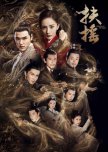
Fantastic appetizer but don't bother with the main course and desert.
This drama really wowed me at the beginning - heart stopping kungfu fight scenes, the two leads had good banter and chemistry, the set was gorgeous (obviously big budget) and the story had a good balance of intrigue, romance, action and good and evil characters. I was hooked and truly enjoyed the first 25-30 episodes of it. Then just when you are at the point of addiction, the show peaks, which is just plain cruel. And then in a truly impressive way the show crashes and burns, getting progressively worse as it advances. I kept watching in the desperate hope that it would turn itself around but sadly it did not. It was as if an entirely different production crew took over and set out to purposely destroy the show. The plot meandered down multiple mind numbingly boring and ultimately repetitive political plots to steal the thrones in 3 of the 5 kingdoms only to be foiled by Fuyao and her friends. There were lots of unnecessary side characters and multiple unanswered and non sequitor sub plots. Not to mention the many long winded and boring philosophical discussions that I strongly suggest fast forwarding through unless you have trouble falling asleep at night.Ethan Ruan and Yang Mi were great together most of the time and especially at the beginning. However, there were long periods where Fuyao/Yang Mi was on her own and the story/actress could not really carry those moments alone, frequently coming across as reckless and annoying. I did not love the supporting cast either and I felt that Vengo Gao's role/storyline was almost as if they were trying out two potential male leads with parallel (repetitive) plots to see which was better. Obviously Yang Mi and Vengo have zero chemistry and that sub plot that went on forever should have been eliminated altogether. I guess the entire crew was being paid by the episode judging from how it ended up being all pasted together to create one big mess of a storyline. Its a shame because this could have been a terrific and memorable (much shorter) drama with some ruthless editing and tighter script/plot writing.
The only thing epic about this drama is the effort I had to put in to see it through the end. Starts with a bang and then death by a thousand cuts of boring inanity. This is one of those shows that definitely would have benefited greatly from the latest Chinese government ban on excessive budgets that lead to too many unnecessary episodes in Chinese costume dramas. To be fair, I would say the first say 30 episodes are actually worth watching. If you can endure some suffering you can even watch a few more episodes until Fuyao discovers Wu Ji's real identity. After that, do yourself a huge favor and drop it. You will just feel angry and cheated if like me, you persist until the bitter end because it then becomes just so, so much more bad than good.
Questa recensione ti è stata utile?

The Promise Keepers
21 persone hanno trovato utile questa recensione
But I have promises to keep, and miles to go before I sleep.
Patience is required for this drama that is unlikely to enjoy broad appeal. It is a Beijing Academy student production so don't expect high production values; indeed there is a distinctly amateurish and unpolished feel to the entire effort.The shadowy and suspenseful plot is steeped in the supernatural and mythology and takes a long time to unfold. The synopsis, which already gives away much of the story adds to the impression that nothing is happening. Hidden forces conspire to release the demon Jiu Ying, that according to legend was sealed by five deities representing the five elements (metal, earth, water, fire and wood). This manifests itself in increasing hostilities between the You Kingdom and the Wolf Tribe that make war and chaos seem inevitable. These events bring the three siblings Hongxuan, Hongyi and Hongshou whose Baili family has long been the power behind the You throne; together with Ming Yefeng, the leader of the Wolf Tribe who also has a mysterious past with Hong Yi. They are linked by destiny and rediscover their powers so that together with other supernatural beings from a past lifetime, they can once again fulfill an ancient promise to keep the world safe. It is not a complicated or super original fantasy story that culminates in an epic clash between good and evil.
What is interesting about this drama is the characters and the acting. The actors are not given much to work with in terms of dialogue so they have to rely heavily on body language and subtle expressions to convey their characters. This makes the complex characters particularly difficult to get to know and nobody is as they originally appear. It is very difficult to tell who is friend and foe and what their motivations are. For most of the drama, Baili Hongxuan and Ming Yefeng were the most complex and interesting characters for me. While they are both quite grey, both turned out to be quite different from what I expected and almost opposite of each other. I really enjoy this kind of peeling of the onion approach in terms of how a layered character gradually becomes unveiled but many will find this kind of storytelling frustrating and boring.
I suspect many may be interested in this because of Wu Lei and Song Zuer. I admit I discovered this because of Wu Lei. While his character Baili Honsghou is quite one dimensional - the typical c-drama hero that goes through many common tropes; it is the best performance I have seen from Wu Lei since NIF. It is very nice to see how far he has come as an actor; that he is not just an incredibly athletic lean, mean, killing machine. As for Song Zuer, she is an actress that provokes strong reactions, especially when she plays the bratty young girl. I never minded her that much because I always noticed that she has screen presence that belies her small size and her performance in this also showed much progress and was actually quite nuanced towards the end. And it will be remiss of me to not mention how super hot Zheng Kai's Ming Yefeng is - I can't believe I have never seen this actor before!
The story advances much more quickly in the last 10-12 episodes although it appears a bit messy as many characters are introduced at once. But they are not interesting characters and all you need to really know is that they are either obstacles to be overcome or they are there to give some assistance along the way. All of the substantively relevant characters are introduced at the beginning. There are a few nice twists at the end with respect to the emperor as well as the mysterious man in the hood. The ultimate villain (to me was not Jiu Ying) was hiding in plain sight the whole time but their motive for unleashing evil on the world was pedestrian and lame. Most of the so-called heroes or deities in this show have feet of clay, do not have high morals and are not particularly enlightened beings. The story is very matter of factly callous in its treatment of spirits or demons. This is very typical of the genre so if you are familiar with Chinese mythology, you will not be surprised by any of this or how the story ends.
I enjoyed this drama but it is not for everyone. Watch at your own risk.
Questa recensione ti è stata utile?
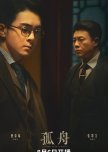
Strong on character but short on plot.
A Lonely Hero's Journey is about a young man's brave and lonely resistance to Japanese occupation. It is set in Suzhuo in 1941, just four years before Japanese forces withdrew from China. At the time, Suzhuo was administered by the Wang Puppet Regime; which was formed by a faction of the KMT that defected to the Japanese. The Wang Regime called themselves peace seekers and didn't have much authority but are regarded as traitors in history. While Suzhou was not the epicenter of resistance against the Japanese, it is a gorgeous and culturally significant historical city in China. This drama highlights the scenery, architecture and culture of Suzhou, including authentic famous Suzhou ballads. Its not your typical highly trained spy vs spy espionage story but rather about the defiance of ordinary people.Gu Yizhong is a Western educated architect and the young master of the prominent and patriotic Gu family in Suzhou. On a rescue operation went awry, he gets framed as a Japanese traitor and is isolated and condemned by friends and family. He infiltrates the Suzhuo Secret Service station run by Zhou Zhifei to find out who the real traitor Cell 8 is. Zhifei of course knows who the real Cell 8 is and doesn't trust him for one moment. Zhifei and Yizhong are parallel characters that at a high level, share a common hatred for the Japanese. As individuals they are pushed to make difficult choices at pivotal moments of their lives. To survive they both have to be flexible; sacrificing a father, or a a son and their first love. Somewhere along the way Zhifei lost himself and became corrupt whereas Yizhong manages to hold on to his beliefs. In Yizhong, Zhifei sees the better man that he could have been but is not. In the guise of a mentor, Zifei goes after him like he is exorcising a ghost; destroying all that Yizhong values to bring about his moral downfall. Zhang Songwen is compelling as this selfish, dark and diabolical character, who occasionally allows glimpses of his lost humanity to shine through in his dealings with the two women he loves, his son and his mentor Mr Li.
This drama is very well cast and in addition to Zhang Songwen, is anchored by impressive portrayals by veteran actors Zhang Fengyi and Zhang Yao. In fact I think Zhang Fengyi's Gu Xixing stole the show. The drama starts to go downhill when Xixing exits and completely falls apart after Ou Xinping exits. The younger cast also delivers credible performances against the older actors. At times, Zeng Shunxi's portrayal lacks intensity and could be nuanced with inner conflict when it comes to how he feels about Haimo and Ruotong. Instead, he gives us nothing there so the way they ended left me scratching my head.
One of the best features of this story is how strong all of the women are in their own ways. Ou Xinping is not just a survivor, she is a killer with immovable convictions. Zhang Haimo is cool headed and calm, someone who is motivated by personal connections and loyalty rather than ideology. Unfortunately Haimo's character is destroyed after her walk away is walked back almost as an after thought to try to salvage the shipwreck of a storyline. This is Chen Duling's best role to date and I must commend her effort in even matching the lip movements of the very hard to sing Suzhou ballads. At sharp contrast is the passionate Xiao Ruotong who is far more emotional and willing to sacrifice for her ideals. Wang Yuwen's acting feels very genuine, evoking a moving picture of a young girl somewhat overwhelmed by the tide of history.
Despite wholehearted performances from the cast, this drama is strong on character but short on plot. The plot arcs lack logic and don't hold up well against close scrutiny. It is debatable whether Yizhong needed to make such immense sacrifices to isolate himself as a lonely boat that infiltrates the Suzou Bureau. His codename 孤舟/Gū Zhōu or Lonely Boat is too close a homonym to his surname Gù/顾 he may as well advertise that he is the CPC spy. The identity of Cell 8 is too obvious, diminishing the sense of suspense and is uncovered without much help from him. I was ready to fling my wine at the TV when the enemy simply allows Yizhong to walk away with the only key piece of military intelligence he obtained because he shamed his country for occupying China! After Japan lost WW2, it was absurd that Zhifei still stuck around simply to try to frame Yizhong rather than fleeing like the rat he is. But I guess in these kinds of stories the bad guy doesn't get to sail off into the sunset with his ill gotten gains. This is one of those dramas that can only be enjoyed if you watch the character stories and completely turn off your brain when it comes to the plot.
Even though this starts well and the acting is good, it starts going downhill just before the halfway point. I can only recommend watching this if you are a fan of any of the main actors or if you are interested in Suzhou culture. If not, there are too many better Republican spy dramas out there with tight and suspenseful plots. My overall rating 6.5/10.0.
Questa recensione ti è stata utile?

Min Guo Da Zhen Tan
28 persone hanno trovato utile questa recensione
All style no substance.
I was really excited to watch this Republican period detective drama. Having enjoyed Hu Yitian and Zhang Yunlong's chemistry in My Roommate is A Detective, I couldn't wait to see them team up again in a similar setting. The adaptation of Agatha Christie's Poirot mysteries seemed like an added bonus. Sad to say, despite the visually sumptuous set and costumes, both the characters and cases are bland, uninspired and the pacing is very draggy.While Situ Yan is the lead detective, he is not meant to be a literal adaptation of Hercule Poirot. Poirot with his known eccentricities including his fastidiousness and obsession with symmetry, is one of the the most distinctive, well dimensioned fictional detectives ever. He has a clear process and methodology that is based on human nature and psychology for solving the case. I would never cast Hu Yitian as Poirot and I am ok with the fact that Situ Yan is not Poirot. What I am not ok with is the colorless, cardboard characterisation of Situ Yan as simply a highly intelligent but rather lethargic lawyer with a strong sense of justice. Hu Yitian does his best with the role but he doesn't have much to work with. This is made worse by Luo Shaochuan, the money guy whose contribution to the crime solving aspects of the partnership is unclear. This character is so indifferently written it is not worthy of an actor of Zhang Yunlong's calibre. The two leads get little screen time together as they go down disparate paths in the investigations. Unlike their previous best loved collaboration, Zhou Mowan is more often Situ Yan's sidekick than Luo Shaochuan is. Thus we don't get to enjoy their banter and their incredible chemistry that builds up and fleshes out both characters as they work through the cases. While both female leads are well written and likeable, they crowd out the bromance.
When it comes to adapting these beloved Poirot classics, I am no die-hard Christie purist. I am receptive to and have seen good adaptations that take a fair amount of liberties with the original works. This can be successfully achieved because changes notwithstanding, the adaptation remains true to the essence of Christie; the psychology of the crime. This is where Checkmate fails to deliver. The supporting cast is very mediocre and lacks screen presence. Bland storytelling and poor pacing with unnecessary romantic digressions disrupts the build up in suspenseful tension into the final reveals. The cases must be evaluated convincingly from the point of view of each character, to assess their psychology as a sense of imminent peril escalates. Who was the victim? Why would someone want them dead? Who would cross that line and actually do the dastardly deed? This drama fails to make me feel invested in the human aspects - the victims and potential suspects; it fails to create a sense of urgency to solve the case or engender that mixture of sorrow, pity and revulsion for the perpetrator that is signature Christie.
The first case is Murder on the Orient Express, a well known case that has been adapted to death. While this version does not stand out, it stays close to the original and is fairly well done. Although Roger Ackroyd is also quite well done considering how difficult it is to adapt an unreliable narrator case into this format, from there, things start to go downhill. These cases are masterpieces; material changes should be weighed carefully and not made with the misguided idea that such impeccable Christie plots have scope for improvement or merely for the sake of delivering a surprise twist. Which is what they did to one of my personal favourites. They went for the plausible alternative solution which simply did not fit the human nature aspects of the case. And thus fails to deliver Christie's magic wow factor, the thrill and the chill and that sense of shock, sorrow and acceptance that it all made sense; that it is the best and only solution. It devolves further as cases are stitched together in a cut and paste fashion that is increasingly incoherent. The final case bears little resemblance to what I think must be the original. While it took no genius to spot the the final antagonists a mile away, their motives are uninteresting and unconvincing and the ending is frankly farcical.
If you are a Christie purist, I would say avoid this drama. You will feel they have desecrated some of the author's best works. If not, this is a watchable if unexceptional adaptation. The production values are quite good and the Republican period setting in Harbin has some novelty appeal even though the drama overall is all style no substance. This is a 7.0 for me but I would have rated it 7.5 if they didn't ruin Five Little Pigs and finish in such an absurd manner.
Questa recensione ti è stata utile?
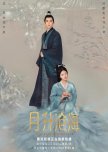
Love Like the Galaxy: Part 2
50 persone hanno trovato utile questa recensione
Birds of a feather.
The second part of Love Like the Galaxy 月升沧海 (The Moon Rises over the Ocean) is shades darker as Cheng Shaoshang struggles to open her heart and mind while Ling Buyi's secrets and inner demons are revealed. Their romance plays out in the bosom of the royal family, where Shaoshang blossoms under Empress Xuan's affection and tutelage. This subjects our golden couple to much envy and political intrigue.Shaoshang of Part 1 is disappointingly over empathetic and likeable. Shaoshang of Part 2 is immature and frustrating to the point of being dislikeable, This is exactly how she is meant to be depicted and the portrayal I was waiting for. So I must applaud Zhao Lusi for so daringly rendering Shaoshang as a difficult, often petty, unforgiving, vengeful child woman who wallows most unbecomingly in self pity. As an unloved child, Shaoshang is terrified of love. While she tries to figure out what she wants in a partner, she puts up all kinds of walls and clings to any excuse to not allow Ling Buyi in. She is her own worst enemy, fighting happiness every step of the way. Ling Buyi's infinite patience and indulgence of her is so hot anyone else would have succumbed to raging hormones in short order. Not Shaoshang though. She knows her worth and digs in her heels to demand to be an equal partner in every sense and meaning of that term. While highly usual for a woman of that time, it resonates with modern audiences for obvious reasons.
There aren't really good villains in this drama. That is because Ling Buyi is such a chilling character that he is already as close to a villain as can be. He is a man with a secret, one whose entire raison détre is to uncover the master mind behind the Gu City massacre and to avenge the Huo clan. He did not expect to fall for anyone and certainly not Shaoshang. He meant it when he said they were on different paths. On many occasions he merely eases her way with the intent of letting her go but never quite succeeds. He loves her selflessly and indulges her worst instincts, especially her vengefulness. Hence Yuan Shen's blinding epiphany that Buyi and Shaoshang are birds of a feather. They are rebellious and vengeful eye for an eye kind of people who can't tell the difference between a chicken and a duck. They are also at surface cold, unforgiving even selfish but in truth feel deeply. I find Wu Lei's acting in Part 2 more natural and compelling. He is such a patient, warm and tender person but only for Shaoshang. This is utterly different from the cold-hearted, calculating general who is a borderline psychopathic killer to his enemies. Wu Lei's combat scenes are simply the best. The aesthetic camera angles and gorgeous choreography brilliantly captures his stunning athleticism and graphic, muscular, ferocity that is capable of mowing down an entire battalion.
For me, Empress Xuan is the true hero of this story. As much as I enjoyed Buyi and Shaoshang's journey, it is her story and that of Wen-di and Consort Yue that I find so much more complex and moving. Told with epigrammatic dark humor that dulls the edges of their pain and sacrifice, they are nonetheless imprisoned by values that are bigger than themselves. While Consort Yue lashes out with wit and acerbity, Empress Xuan suffers in dignified silence. Do not be angry with Shaoshang for finding it so difficult to forgive Buyi. Although his cause is just and the outcome serves the greater good, it cost Empress Xuan everything. Shaoshang's first unselfish, grown up act is to accompany her, to atone for what Buyi did and for how she unknowingly helped him. That is what devastates her as much as Buyi reneging on his promise to her. Buyi knows and understands this. Without Empress Xuan's forgiveness and generosity of spirit, they may not have found a way to forgive themselves and each other. Her love is truly like the galaxy in its vastness and selflessness. The galaxy owes it to her to make sure she and Wen-di do not meet again.
In terms of storytelling, very much like Part 1, Part 2 wastes too much time on too many delusional love sick women who conspire against the lovers. This comes at the cost of the storytelling. which towards the end suffers from heavy cuts and sloppy editing. As a result, characters like Lou Ben and Tian Shuo are not properly fleshed out and I did not feel that invested in either the Peng Kun or Guo Village arcs, which feel rushed. When they could have simply omitted both the Fifth Princess and Luo Ji Tong's arcs which were superfluous to the plot. It also underscores how nasty, dumb and divorced from reality the vast majority of the women in this drama are. I really do not like this type of misogynistic and cynical depiction of womenkind. Even though the ending is very satisfying, especially when it comes to the character stories, the unfolding of the plot which we waited way too long for is not well done. Considering the stunning production values, it is a shame if they do not go back and re-edit it with some of the cut footage into a Director's Cut.
All things considered, I enjoyed this beautifully written drama immensely. I find Part 2 slightly better than Part 1 and am pleased to rate the drama in its entirety and Part 2 on a standalone basis a 9.0, better than my 8.5 rating for Part 1 by itself.
Questa recensione ti è stata utile?

Questa recensione può contenere spoiler
Just Say No.
This is not an easy drama to watch. It shines an unflinching spotlight on the unchecked, oppressive soft power of the uber rich and how society and by extension the legal system holds victims to an impossible standard of perfection. The narrative opens with a married, high powered CEO Cheng Gong caught in flagrante delicto with his assistant Zhao Xun, after an inebriated night of corporate entertainment. The media is at the scene and a full blown scandal ensues with dire consequences for both parties. Cheng Gong's team of fixers led by his relentless public relations executive Li Yi and a sharp lawyer Lin Kan swoop in immediately to understand and contain the situation.As the facts emerge, it becomes clear that Cheng Gong and Zhao Xun remember the night very differently and the situation devolves quickly into "he said she said". Zhao Xun is a mass of contradictions who struggles to understand her own version of the truth, which obviously does not square with Cheng Gong's. Both parties are victims that are damaged by the fallout and they each believe in their own version of the truth, which the drama explores in a very balanced way. The key question is does silence mean consent? This should be straightforward - she can just say no. She could have and should have done just that. Lin Yun delivers a heartbreakingly convincing articulation of just how difficult, near impossible it is for someone in Zhao Xun's position to do that in the face of the massively uneven power dynamics between herself and Cheng Gong. Her downfall was foreshadowed long before her failure to speak up at the point of no return. She was doomed from the moment he saw her, wanted her and tempted her with fast advancement, the material trappings of wealth and the heady mix of the power of the executive suite. She was complicit and she loathed herself for it. Yet I felt real sorry for her and I understood why she felt wronged. While most praise Zhou Xun's portrayal of Lin Kan, for me Lin Yun as Zhao Xun was the outstanding performance. She made me deeply empathise with this young, flawed, inconsistent, movingly vulnerable and imperfectly human character that struggles to find her voice.
Even though Liu Yijun always delivers, he takes it to the next level with his mesmerising portrayal of a sociopathic like Cheng Gong who believes that everyone has a price and how ruthlessly and manipulatively he wields his power to get his way. His sense of entitlement, utter lack of self awareness and inability to grasp how disconnected he is from common humanity and decency is scary and pathetic. As for Zhou Xun, her Lin Kan is a shark with a bottom line. Her skilled probing questions delivered with a sharp, liquid and searching gaze and her calm, dispassionate and and incisive legal analysis enunciated in her deep, rich and deliberate voice is superb. Her mature, confident beauty and elegant and nuanced empathic line delivery has taken viewers by storm. Only a phenomenal veteran cast like this can deliver such convincing, multi-faceted and realistic portrayals.
The drama's strongest arc is the opening - it made me very sad and very, very angry at pretty much every main character. This kind of story however is difficult to end in a good and realistic way. I think this would be a better if it were shorter as the drama's core message that women need to find their voice and that an imperfect victim is still a victim hits home early on. I didn't think Lin Kan's "Me Too" arc is necessary and it doesn't quite come off the right way how a stronger character succumbs to the same temptations yet manages to emerge largely unscathed albeit scarred nonetheless. I also don't like how Lin Kan is written overall notwithstanding Zhou Xun's charismatic acting. It would have been better if Lin Kan chose sides early in the game and was pitted against Li Yi or her mentor early on rather than making her all things to all people. This results in too many conflicts of interest that are just glossed over. Despite her alleged bottom line, Lin Kan appears unscrupulous in how close she gets to Zhao Xun. It is also not realistic that Zhao Xun never seeks her own legal advice. Finally, the way Lin Kan prevails using information she obtained while acting for the other side is just plain wrong and practically impossible.
The drama literally and figuratively goes off a cliff in a way that makes the last third of it a less convincing watch. It doesn't make sense that a smart and manipulative character like Cheng Gong continues to go persecute Zhao Xun after she becomes so wretched and pitiful. It is just a contrived way to force an ending message that in China, even imperfect victims can find their voice via the justice system. My biggest issue with the story however is that the worst, most vile character is a woman who enabled Cheng Gong and victimised Zhao Xun just as much if not more. She shows no remorse and there are no true consequences for her. This aspect of the ending deeply disappointed me; I needed to see her confronted and at least punched in the face! Despite her superb visual composition style, storytelling wise Yang Yang proves once again her inability to wrap up the narrative while she is ahead. Nonetheless, the first half or so of this drama tackles some heartbreaking and controversial issues masterfully and is worthy of an 8.5. Unfortunately the writing doesn't hold up and it nosedives into an 8.0 towards the end and that is my overall rating. It is still worth watching when you are in the mood for a thought provoking drama that closely resembles a recent real case with all around amazing acting.
Questa recensione ti è stata utile?

The Legend of Zhuohua
53 persone hanno trovato utile questa recensione
Women should not rule the world.
The Legend of Zhuohua is another in a string of recent female empowerment themed historical romantic dramas. The production is upfront that this drama is a work of pure fiction. It is impossible for women to exercise the kind of influence and authority portrayed in this story in ancient Chinese patriachical society. The attitudes and values articulated are also incredibly modern and unsurprisingly, resonate with current audiences. It should be enjoyed at face value accepting that many aspects of it are sheer fantasy.Titular character Ma Zhuohua flees an arranged marriage to the capital; where she must pass the imperial exams to fulfill her ambition to be a female official. Quick witted and resourceful, she saves Lord Ding, a decorated war hero, when he is wouded in the middle of a clandestine operation. Their fates intertwine as he is the strongest advocate of opening up scholarship and official positions to women. As they collaborate on official assignments and work toward their shared vision of the country, they fall in love. Can their relationship navigate a feudal system that requires women officials to choose between marriage and their career?
The most enjoyable arcs of this drama are the early courtship ones. This is the first time I have enjoyed Jing Tian's playing such a clever, demurely mischevious and independent character. Despite a ghastly white color filter and not the best dubbing, the strong chemistry between Jing Tian and Feng Shaofeng is unmistakable. It is so refreshing and very hot to see such a candid, lively and purely adult relationship dynanic laced with flirtatiously racey dialogue. The humor is very well written and so cheekily portrayed that I laughed uproariously many times, and especially at the dirty jokes. The political commentary and philosophical debates are surprisingly well written, with a sophistication beyond what I would expect of a light romantic comedy like this.
Outside the empowerment theme, the sub-plots are not special but this top notch veteran cast is very charismatic and executes so well it makes up for some of the lack of originality. Both Shi Yueling and Wang Likun in particular deliver formidable, almost terrifying performances as Empress Dowager Zhou and Princess Roujia. I also found Roujia's complicated relationship with Shen Jinghong very interesting. Unfortunately just after the mid-way point, the narrative rehashes tired plotlines including noble idiocy, murder most foul and high treason. In quite a similar vein to Destined, it nose dives into a poorly designed political melodrama and predictible twists. Even incredible acting cannot paper over that this is yet another delusional ends justifies the means antagonist with an unconvincing villain origin backstory.
This would have made a much better 20 episode drama that ended on the intended message that women should seize their dreams. The writers took it one step further into women can also seize the world. And then left us with an unambiguous message that women should not rule the world. The first few arcs of this are worth about an 8.0 but the latter arcs are just 6.0/6.5. I can only give this a 7.0. Its still a quality production with some good laughs to pass some time but it won't rock your world.
Questa recensione ti è stata utile?

Beauty of Resilience
56 persone hanno trovato utile questa recensione
Identity Theft.
Here we go again - yet another ill-fated master disciple relationship! This starts predictably with a jinxed mortal Wei Zhi barely squeaking through into the prestigious Egret Academy. There her astounding lack of talent catches the attention and empathy of her master, Yan Yue. He is an immortal sent to discover and vanquish the remnant of the phoenix bloodline that is a threat to the Three Realms. You would never guess who the hidden phoenix is or that this cold faced inheritor of the realms falls in love with his enemy?!?Within a tired and tropey premise, the plot design of Beauty of Resilience is actually pretty good with some interesting and innovative takes. I found the Egret Academy's challenge arc to be very enjoyable in a way reminiscent of the Triwizard competition in Harry Potter and the Goblet of Fire. And I was intrigued by the mysterious Zihua Book Pavilion and its Shylock like master who extracts his pound of flesh. I also like that the Heavenly Empress is not just a decorative vase but has a rather important function as the mistress of time. Even the concept of Hua Rong is fresh and mysterious. Yet these ideas just don't quite come together in a good way in terms of plot and character progression.
Indifferent character blueprints, mis-cast roles and uninspired portrayals are this drama's weakest features. While Guo Junchen's portrayals of multiple roles is technically faultless, he is not given much to work with. Yan Yue is just a cardboard xianxia archetype. He only gets to shine briefly as the morally conflicted Chen Yan and in his darker personas but enough to impress as a diverse young actor. He and Ju Jingyi look fantastic together and they actually have decent chemistry. While her acting here is more nuanced, Ju Jingyi, once again delivers the same old vapid, completely indistinguishable portrayal that is her comfort zone. This is compounded by her default styling with atrocious Persian princess head gear and heavy handed and unflattering eye makeup that makes her look like she just waltzes from one set to another. She actually has excellent comedic timing which sadly this humourless script gives her no chance to showcase. Mu Nan is the only engaging and empathetic character but is sadly matched up with the most tedious and mis-cast role. And that is just the tip of the ice berg in terms of how shabbily the writers treat him.
The supporting roles are one dimensional and the cast lacks experience, chemistry and rapport. Everyone is obviously acting and their relationships and interactions are so forced I couldn't engage with or care for any of them. There were way too many identity thefts going on where even the lead actors in the swapped roles are unconvincing as the characters whose identities they stepped into. It was so bad at times it was kind of funny. The villains are quite obvious from the beginning and they weren't satisfactorily dealt with. One of them perished so quickly I literally blinked and missed it. I went episodes thinking they were lurking for the right moment to pop out again. My hope for a satisfyingly long, painful and drawn out demise was never met.
This drama's strongest arcs are the early ones that take place in the mortal realm. After that the drama loses momentum and gets more ridiculous as it progresses. The ending however is quite original and quite cool but was so rushed and poorly executed that it took awhile for what actually happened to sink in. I would say this is something that you could watch up until the wedding in the second arc, skip all the messy and time wasting latter arcs and you'd still end up in the same place. The early arcs were a watchable 7.0/7.5 for me but I'd at most rate the latter arcs 5.0 for an overall rating of 6.0. Watch at your own risk.
Questa recensione ti è stata utile?

Agent Provocateur.
Jiang Ying, a bewitching songbird catches the eye of both Du Xunyu and his father, shipping magnate Du Jingchuan. The way she lures and provokes both men with her innocent wiles and wraps them around her finger is riveting. She is clearly up to no good but Du Xunyu has his own agenda and is willing to play along with her. This short drama starts strongly with a predictable but well executed revenge plot. Masterful and nuanced portrayals by the main actors and searing chemistry and palpable tension between the leads elevates the simple plot with well-drawn and resonating characterizations. Li Muchen (as Jiang Ying)in particular delivers a captivating performance as a seductive and manipulative agent provocateur that sows the seeds of discord in the Du household.This short drama is compelling up to the final five episodes and then it manages to turn into a banal, draggy and somewhat sappy love story. The drama never delivers on the early promise of a very intense and passionate romance; lapsing into a very sweet one instead. The latter part of this drama is an example of how bad things happen when these short dramas end up with more budget and screen time. The ending was the worst - bafflingly attempting unnecessary melodrama when it should have and could have ended with a flourish after all the secrets are revealed. Although I still recommend this as a good short drama to pass time with, I can only rate this 7.5 because of the ending sag.
Questa recensione ti è stata utile?
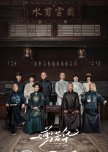
The Master of Cheongsam
20 persone hanno trovato utile questa recensione
A cut above.
This is a wonderfully produced drama that deserves a lot more attention. It is a riveting tale of sibling rivalry that spans a time of rapid change and turbulence in modern Chinese history. Jiang Mosheng and Lu Yuanzhi are both adopted and apprenticed by Master Su Jingan of Sancai (Triple Cut) House, couturier of the Qing Imperial Court. Sancai House routinely outshines other rival houses in the workmanship, symbolism and design of the intricate ornamentation of the Dowager Empress' court robes, allegedly due to their seamless stitch, a tradecraft that is passed down from one generation to another. Master Su's most bitter rival is his former fellow apprentice, Master Bai Henian of Sihe House.Jiang Mosheng is the older, steady, responsible brother and heir apparent, whose great talent is meaningfully enhanced by his passion and dedication. Lu Yuanzhi is the hot headed, audacious and visionary brother; a rare talent whose brilliance is nothing short of genius. His recklessness however lands him in serious trouble. To save him, Mosheng cuts ties with Sancai House, defects to Sihe House and accepts Master Bai as his foster father. This sets the brothers down a complicated path of reluctant rivalry, conflicting loyalties, mutual friendships, convenient alliances, mistrust, betrayal and forgiveness. The most prominent feature of this drama is the Abel and Cain relationship between the brothers and it is well written, consistent and riveting. Both of them are flawed characters and neither is completely blameless for how things play out between them. Although Yuanzhi learns to rein in his recklessness and temper as he matures, it still manages to get the better of him. His culpability over Mosheng's sacrifice constantly lingers in the air between them. Even though he can be such an ass, I have to sympathise with Mosheng's battle with his own worst instincts in the shadow of someone who is perpetually a cut above. Both Zhang Haowei and Hong Yao delivered excellent, empathetic performances, alternately frustrating, enraging and beguiling me at all the right moments.
How the design of the cheongsam or qipao evolves to reflect the changing attitudes of times is the main, fascinating centrepiece of the drama. While not in the same league as the more modern and sophisticated qipaos of Wong Kar Wai's iconic In The Mood for Love, all of the outfits from the Qing court robes to the Western flapper dresses are simply gorgeous and I truly enjoyed the mini history of Chinese costume. How the female characters are dressed is also symbolic of who they are - Yaoyao is a remnant of the past at sharp contrast with Lijun, the ultimate, progressive modern woman. Kang Ning sits in the middle - she embraces change in a way that marries it with tradition; and thus she is truly Yuanzhi's muse. True to character, both Kang Ning and Lijun have a very refreshing attitude towards relationships and love that I truly enjoy and they fight to write their own stories even when events conspire against them. The only character I didn't like is Yaoyao who is your typical c-drama archetype but she is written that way as a foil for the other two. There are enough dimensional, grey and consequential characters in this drama that I am very satisfied with the character aspects of it. Most of these key roles are performed by veteran actors whose acting often surpasses the quality of the dialogue. I laughed my head off at the dynamics between Lijun, Feiyu and her father.
This is largely a character driven drama where the main characters have to cope with the changing times as they transition from the Qing era to the Republican era and Japanese incursion. While the pace is fast with many exciting and unexpected turns along the way, not all of the sub plots and arcs are consistently well written. Some of the stressing events that the main characters face are a bit contrived, can be lazily written and at times defy logic. But between excellent acting and all the interesting character developments, I found the plot holes quite easy to forgive. I do appreciate how all of the characters go through rough times, experience loss, how actions have consequences and justice is often blind. The villains are decent but less interesting than the characters themselves, some of whom are quite grey if not outright vile.
I am happy to recommend this as a very enjoyable watch with some good fresh takes on old tropes. Overall for me this is an 8.0.
Questa recensione ti è stata utile?

Cops and Robbers
The First Shot 雪迷宫 is a classic cops and robbers crime thriller featuring China's early efforts to combat drug trafficking in the late 1990s. It seamlessly fuses together proven themes of friendship, loyalty and betrayal, and good vs evil; all the elements that make this genre enduringly popular. It is set in a fictional city Halan in frigidly cold Northeast China and is about a newly established anti-narcotics team's early efforts to combat an influx of drugs into the region. Lacking basic knowledge of synthetic drug manufacturing, Zhang Bei is sent to Huazhou in Southern China to recruit Gu Yiran, an expert chemistry professor to join his team. Due to the initial influx of drugs into Southern China in the earlly 1990s, Gu Yiran's familiarity with the habits and tactics of the traffickers proves as invaluable as his knowledge of chemistry.This is a well made drama if you can excuse the meagre, cheesy 1990s look and feel that gets a much needed boost by Jacky Cheung's top Cantopop and early Mandopop hits from the day. It is definitely not Zhang Yimou behind the camera but the camera angles are quite innovative and the spectacularly choreographed action scenes kept me on the edge of my seat. The crime plot unfolds at a decent cadence with a few really interesting and unpredictable twists and reveals. The bromances were deftly written with each relationship: Zhang Bei and Gu Yiran; Zhang Bei and Jiang Xiaohai and Jaing Xiaohai and Liang Jiaju; illuminating different facets of both Zhang Bei and Jiang Xiaohai.
The investigative unit's rapport resonates and carries the story from the get go with every member doing their own small but crucial part in this tightly knit team. The rabidly feisty Mad Dog Yao kicking butt in any brawl only to be too easily subdued by Zhang Bei cracked me up no end. While I appreciate the narrative taking the time to flesh out the important roles, this drama falls into the usual trap of these plot driven stories of digressing too far into too many personal stories of peripheral side characters. It comes at the cost of the momentum of the investigative plot and the narrative sags in the middle. While Lin Boyang is lovely, I wasn't invested in her sweet but trite romance which went on for so long it bored me silly. This would have been much tighter and more exciting as a 24 episode drama.
I was initially skeptical about Huang Jingyu in this kind of super masculine hero cop who carries the weight of his team and the world on his shoulders kind of role. He has done it too many times and indeed there is nothing about the way the character is written or portrayed that makes Zhang Bei stand out from this tired archetype. Yet maybe its his personal charisma or how he just looks the part so perfectly that his Zhang Bei just "works" in bringing all the other roles and performances together. As much as I like Wang Qizi, Gu Yiran is the character that at the end I liked and cared about the least. He is at surface easy going and amiable but in reality he is lonely and guarded and he has his own agenda. Unfortunately I found his obstinate and repeated Lone Ranger stunts so selfish and boring that it overwhelmed my sympathy for his personal trauma. Although he isn't at Zhao Xiaoguang's level of comically terrible, he is also too obviously not a native Cantonese speaker to successfully pass himself off as one. The role just didn't come to life onscreen in a convincing way and was overshadowed by vastly superior performances by Zhang Yu and Qin Junjie. The truth is fate is random and Lele could well have been any one of them and it is this character that stole the show and made me incredibly conflicted; sad, manipulated, scared, revolted and resigned. It is the best written and best acted role; one that stands out among other stellar performances.
As an avid and frequent consumer of the suspense thrillers, this drama has an excellent ending twist that shocked me and then gave me that aha! moment as all the details just clicked into place. I haven't been surprised like this in a long time and I enjoyed it thoroughly. That said, there is nothing that new or special about the story itself, the plot should have been tightened and there were just so many hidden identities that when you put it all together it looks quite implausible. I am happy to I rate this a very entertaining and enjoyable 8.0/10.0
Questa recensione ti è stata utile?


 53
53 194
194 8
8




















